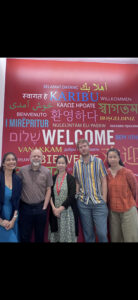Community Featured Articles Lifestyle & Culture
Learning English to make an American life
 By Sophia Lian
By Sophia Lian
At the U-shaped table, six adult students looked intently at their classwork with their pencils in their hands, ready to learn a life-changing skill. Those students come to that Lower East Side location from Sudan, Guinea, and Haiti. And they do so for one reason: to study a new language.
“If you cannot learn it, it’s like you are detached from society. You have to catch up for your future. Learning English will have to be No. 1,” Carol Ng, who helps run the Henry Street Settlement ESOL Program, said.
Ng is a Malaysian native who came to the U.S. in 2009. She knows the power of being multilingual because she speaks Mandarin, Cantonese, and later learned English in the U.S. Her language capabilities gave her a job 22 years ago at the Henry Street Settlement, where she now empowered other immigrants to learn English like she did. “It was just a coincidence. Just a new opportunity.”
Kettia Joam, the Haitian and only woman in class that day, came to the U.S. in April 2023. She walked in late to the class and quietly took a seat at the table in front of the hanging U.S. map on the opposite side of the classroom from the other students.
Joam knew very little English and did not feel comfortable speaking in either English or Spanish, her mother tongue. Her only source of communication was through the Google Translate app on her phone. She typed, “I want to work or study” as her American dream.
Edwin Harris, the instructor of the morning Summer English Class, stood in front of the classroom. Harris used hand gestures to give instructions to guide the beginner students to work collaboratively on that day’s worksheet that asked basic questions, including their name, age, and date of birth.
“We never have a problem with motivation. Students are here, really excited to learn,” said Harris. In Harris’s classroom, he teaches primary content that students can make use of in everyday life.
The Henry Street Settlement ESOL (English for speakers of other languages) program is not just focused on language skills. Its Job Readiness Program teaches students how to fill out an employment application, what to wear, how to ace a job interview, and how to manage co-worker relationships. After students get a job, Henry Street’s follow-up services include referring students to organizations that provide clothing suitable for job interviews and to organizations that offer job training courses.
“There’s also a bunch of folks who come just knowing that without English in the U.S., it’s really, really challenging,” Program Director Ned Gardner said.
Immigration to the United States declined between 2019 and 2020, during the COVID-19 pandemic, but it is back on the rise. According to the Migration Policy Institute, in 2022, non-U.S. citizens who were born outside of the United States accounted for 13.9% of the total population in the nation, 46.2 million people. That was the largest number of immigrants in US history.
As of 2023, according to the Kaiser Family Foundation, 47% of immigrant adults had limited English proficiency, meaning they “speak English less than very well.”
For a substantial portion of the incoming and existing immigrant community, those statistics are not just numbers. They measure, among other disadvantages, missed job opportunities.
Gardner, who celebrated his 19th anniversary on Henry Street’s payroll last week, said he gets to witness about 600 students a year, finishing the program with more self-esteem and more hope about their prospects in American society.
“It’s the gain in their confidence that I love the most,” Gardner said. “They come and say, ‘You know what? I can speak English, or I can try to speak English now.’”
“Just as long as a student is willing to come learn, I think they all improve,” Ng said.
Joam comes to English class with a similar hopeful strength. “I don’t have a job for now; later I will.”

